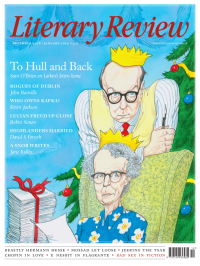Victoria Glendinning
Blooming Marvellous
The female fig wasp is only two millimetres long, with wings finer than a human hair. She is programmed to leave the fig in which she is born and undergo a sequence of ordeals that makes a commando’s training look like a walk in the park, fertilising one particular species of fig in the process and all so as to replicate her own genes. To follow her is like engaging in some ingeniously cruel computer game. I will come back to the fig wasp – and to a compelling way of writing about the natural world.
‘Nature writing’ has always been with us, but since the dawn of this century it has blossomed into a publishing phenomenon, serving as an escape from our alienated, dislocated, polluted society. Most nature writers have been men – individuals whom Kathleen Jamie, herself a stellar contributor to the genre, has stereotyped as ‘the Lone Enraptured Male’. Think Robert Macfarlane, with many before and after him.
But recently some writers have retreated from the tendency to mix immersion in landscape or the lives of wild creatures with sometimes anguished autobiography. There was a time when we just could not get enough

Sign Up to our newsletter
Receive free articles, highlights from the archive, news, details of prizes, and much more.@Lit_Review
Follow Literary Review on Twitter
Twitter Feed
Under its longest-serving editor, Graydon Carter, Vanity Fair was that rare thing – a New York society magazine that published serious journalism.
@PeterPeteryork looks at what Carter got right.
Peter York - Deluxe Editions
Peter York: Deluxe Editions - When the Going Was Good: An Editor’s Adventures During the Last Golden Age of Magazines by Graydon Carter
literaryreview.co.uk
Henry James returned to America in 1904 with three objectives: to see his brother William, to deliver a series of lectures on Balzac, and to gather material for a pair of books about modern America.
Peter Rose follows James out west.
Peter Rose - The Restless Analyst
Peter Rose: The Restless Analyst - Henry James Comes Home: Rediscovering America in the Gilded Age by Peter Brooks...
literaryreview.co.uk
Vladimir Putin served his apprenticeship in the KGB toward the end of the Cold War, a period during which Western societies were infiltrated by so-called 'illegals'.
Piers Brendon examines how the culture of Soviet spycraft shaped his thinking.
Piers Brendon - Tinker, Tailor, Sleeper, Troll
Piers Brendon: Tinker, Tailor, Sleeper, Troll - The Illegals: Russia’s Most Audacious Spies and the Plot to Infiltrate the West by Shaun Walker
literaryreview.co.uk